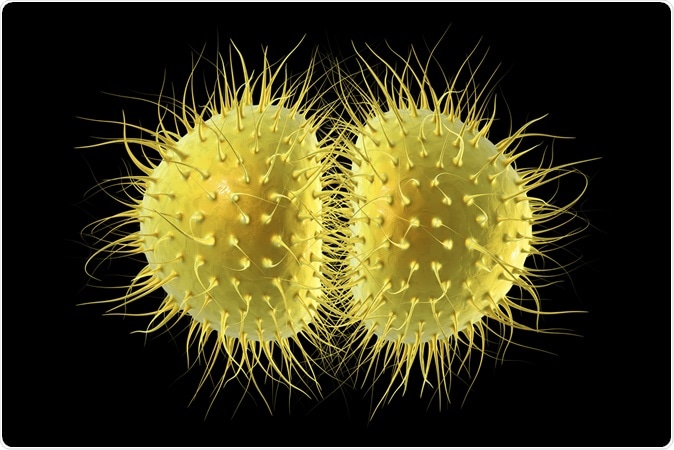A man from United Kingdom has acquired a gonorrhea infection with bacteria that is resistant to most antibiotics used commonly against it. The man has a regular sexual partner but picked up this superbug from a sexual encounter with a partner in south-east Asia earlier this year.

Bacteria Neisseria 3D illustration. Image Credit: Kateryna Kon / Shutterstock
According to the Public Health England, this is the first time that the health officials are faced with gonorrhea bacteria that is unresponsive to the standard first line antibiotics that are commonly used against it. The first line antibiotics against gonorrhea infection are a combination of ceftriaxone and azithromycin. According to Dr Gwenda Hughes, from PHE says that this level of resistance has not been seen before to both the commonly used drugs as well as other first line antibiotics. The World Health Organization and the European Centres for Disease Control agree with the PHE that this is the first case of its kind. At present the officials are on the lookout for more cases and the possible risks of the other sexual partners this man may have had who may be at risk of the infection.
Gonorrhoea, historically known as the “clap”, is a sexually transmitted infection (STI) that is caused by bacteria Neisseria gonorrhoeae, also known as gonococcus. Gonorrhoea is the second most common bacterial STI. It ranks after chlamydia in incidence. Persons with multiple sexual partners who do not use barrier contraceptives like condoms are particularly at risk.
The infection spreads via unprotected sexual encounters. Gonococcus is present in the discharge from the penis and vaginal fluid of the infected men and women. It can be passed from person to person by having unprotected vaginal, oral or anal sex. It can also be transmitted by sharing sex toys and vibrators with an infected individual without washing or covering them with a condom at each use. Gonococcus can also be transmitted from a pregnant woman to her baby.
There may be no symptoms of the infection in half of the individuals. The incubation period is usually taken as being between 2 and 5 days. There may be a discharge from the vagina or penis accompanied by pain during urination, bleeding between periods in women etc. Gonorrhoea can be easily diagnosed through a simple swab test or men may be asked to provide a urine sample.
Gonorrhoea is treatable with antibiotics. Treatment should begin as early as possible. If left untreated, gonorrhoea can lead to more serious long-term health problems. Some of the long term problems associated with untreated gonorrhoea include infertility and pelvic inflammatory disease. In men, if left untreated, complications like inflammation of the epididymis (epididymitis); prostate gland (prostatitis) and urethral structure (urethritis) may occur.
According to Dr Hughes, this patient is being treated with other alternative antibiotics. The PHE is trying to stop the transmission of this infection and detect inadvertent transmission during the incubation period of the infection she added. Experts in the field are concerned about the emergence of resistant strains of these bacteria. Dr. Hughes emphasized the need for renewed efforts to advise people on practicing safe sex to avoid getting infected. According to the WHO, 78 million new infections of gonorrhea occur every year worldwide with 820,000 new gonorrhea infections annually in the United States according to the Centre for Disease Control (CDC).